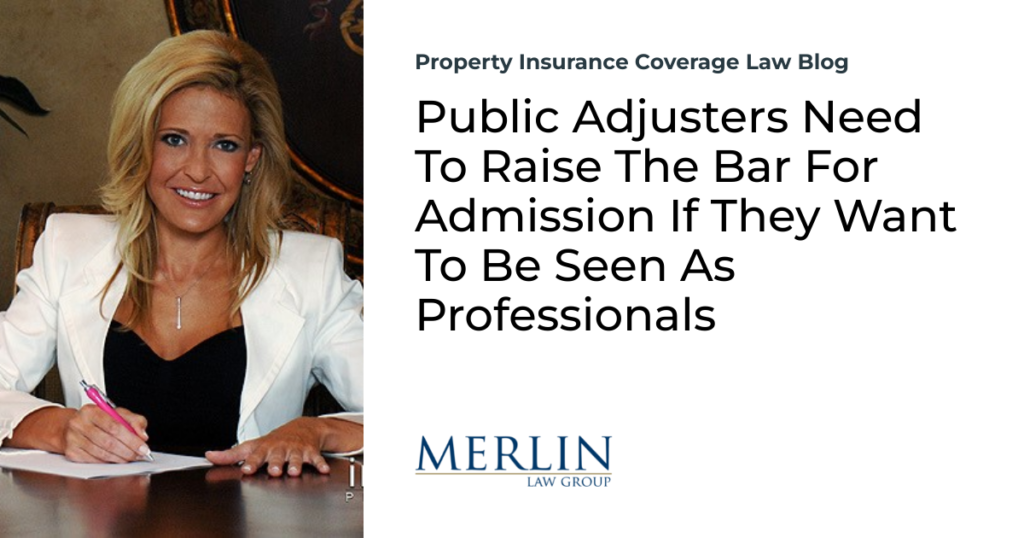Public Adjusters Need To Raise The Bar For Admission If They Want To Be Seen As Professionals

Brian Goodman is the General Counsel for the National Association of Public Insurance Adjusters (NAPIA.) At the First Party Claims Conference, he and Steve Badger debated on a number of topics. One topic concerned the professionalism of public adjusters and the ease of obtaining a public adjusting license. Goodman and Badger agreed that public adjusters should call for increasing the standards for entry to become a public adjuster. I wholeheartedly agree.
Is it easier to become a public adjuster or a hairdresser? I submit it is much harder to become a hairdresser. The vast majority of states require a hairdresser to go to a licensed and approved cosmetology school. The school usually lasts three to six months, depending on the state. The hairdresser then has to pass a two-part licensing exam. One part of the test involves academic knowledge. The other side requires a practical demonstration of skill. Failure can mean having to re-attend school.
Let’s compare the hairdresser who has to attend a school and pass a two-part test to get a license to what Donice Krueger did to become a public adjuster in Texas. Donice had zero experience in public adjusting. While her family owned a construction company, she never worked in it. She had never written a construction estimate. Her contents valuation experience was limited to determining which shoes should be thrown out to make room for new ones. She applied to become a Texas public adjuster, picked up a study book, studied for half a day, and passed the test in less than an hour.
If she wanted to, she could then join almost any public adjusting association. Based on the ease of reciprocity for public adjusting, she could apply for a license in almost every state of the union and obtain a public adjuster license. She could have somebody make up a website for her, which could be copied mainly from other public adjuster websites. She can do all this by obtaining a license, which took her less than a day to obtain, and with no experience, training, or specialized education in first-party claims adjusting.
I firmly believe that in the realm of public adjusting, where policyholders have immense amounts at stake – often ranging from hundreds of thousands to millions of dollars – the path to becoming a public adjuster should be more challenging. The stakes are incredibly high, and the responsibility is immense. Policyholders deserve the best; they deserve professionals who have not only chosen this path but have also earned their place through rigorous training and dedication.
The journey to becoming a public adjuster should be imbued with a sense of purpose and commitment, mirroring the seriousness of the role. It’s a calling that demands more than just basic qualifications; it requires a deep understanding, empathy, and a relentless pursuit of excellence. The barriers to entry in this field should be set high, ensuring that those who step into these roles are not just adequately prepared but are the epitome of professionalism and expertise. Leaders and trusted advisors in this field must champion the elevation of public adjusting. We must strive to make the journey to becoming a public adjuster at least as demanding, if not more, as becoming a skilled barber or hairdresser.
Steve Badger is the only source I could find with any suggested higher standards for licensing as a public adjuster. This is a copy of his LinkedIn post on the topic:
Steve Badger kept saying that those who already had their license would be “grandfathered in” without having to comply with the newer requirements. I think he was trying to win over those in the audience by appealing to their desire to limit new competition. My concern is for the policyholders to receive help from qualified individuals and for current public adjusters to protect their livelihood.
Public adjusters assume a significant role when they choose to represent policyholders. This profession demands a high level of expertise and knowledge due to its multifaceted nature. In my presentation on ethics to public adjusters titled “Would You Hire You?” I emphasize the necessity of mastering over a dozen specialized fields. This breadth of knowledge is crucial for public adjusters to truly excel in their work. The essence of a genuine profession lies in its exclusivity and standards; it’s not a field that should be accessible to individuals lacking the requisite education and experience.
By adhering to elevated standards, public adjusters not only safeguard the interests of the public and policyholders but also secure their own professional livelihood. The integrity and quality of work in public adjusting are directly proportional to the respect and trust it garners from related industries. A high caliber of practice within this field creates a robust defense against potential criticisms and challenges from the insurance sector and legal professionals.
Paul Cordish, the former general counsel of the National Association of Public Insurance Adjusters (NAPIA), frequently cautioned public adjusters about the potential threats to their licensing, especially from lawyers and the insurance industry. These threats become more pronounced and easier to justify when the barriers to entering the field of public adjusting are low, allowing individuals with minimal experience and education to practice. Therefore, maintaining high professional standards is not just a matter of personal pride or ethics; it’s a strategic necessity for the survival and respect of the profession in a competitive and often skeptical marketplace.
Thought For The Day
If a man is called to be a street sweeper, he should sweep streets even as Michelangelo painted, or Beethoven composed music, or Shakespeare wrote poetry. He should sweep streets so well that all the hosts of heaven and earth will pause to say, here lived a great street sweeper who did his job well.
—Martin Luther King Jr.







